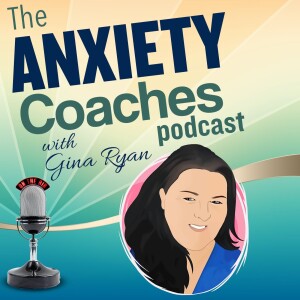
945: Dissociation: Coping Mechanism for Overwhelming Emotions
 2023-07-23
2023-07-23
In today's episode, Gina discusses the relatively common anxiety symptom of dissociation and how to better cope with this distressing experience. Dissociation and derealization are not limited as symptoms to anxiety disorders but occur with other mental health conditions as well, such as depression. Learn that dissociation is not dangerous and comfort yourself that it will pass and it is not a sign of some severe mental pathology.
Please visit our Sponsor Page to find all the links and codes for our awesome sponsors!
https://www.theanxietycoachespodcast.com/sponsors/
Thank you for supporting The Anxiety Coaches Podcast.
Find even more peace and calm with our Supercast premium access membership! https://anxietycoaches.supercast.com/
Here's what's included for $5/month:
❤ New Ad-Free episodes every Sunday and Wednesday
❤ Access to the entire Ad-free back-catalog with over 600 episodes
❤ Premium meditations recorded with you in mind
❤ And more fun surprises along the way!
All this in your favorite podcast app!
To learn more go to:
https://www.theanxietycoachespodcast.com
Join our Group Coaching Full or Mini Membership Program
Learn more about our One-on-One Coaching
What is anxiety?
Quote:
Healing may not be so much about getting better, as about letting go of everything that isn’t you – all of the expectations, all of the beliefs – and becoming who you are.
–Rachel Naomi Remen
Chapters0:00:48 Coping with Overwhelming Emotions: Dissociation Explained
0:02:02 Causes of Dissociation: Trauma, Childhood Experiences, Attachment Disruptions
0:04:38 Biological Factors and Predisposition to Dissociative Disorders
0:05:35 Understanding Dissociation as a Coping Mechanism
0:07:45 Common Symptoms of Dissociation
0:13:19 Dissociation and its Connection to Mental Health Issues
SummaryIn today's episode, we delve into the topic of dissociation as a coping mechanism for overwhelming emotions. Dissociation is not exclusive to individuals diagnosed with dissociative disorders - it can occur in anyone facing highly emotionally overwhelming situations. Trauma, especially childhood trauma like abuse or neglect, is a primary cause of dissociation. Other factors such as adverse childhood experiences, attachment disruptions, biological factors, and cultural/societal factors can also contribute to dissociation.
Dissociation serves as a way for individuals to cope with overwhelming emotions by mentally disconnecting or escaping from distressing situations. It often co-occurs with other mental health conditions such as PTSD, depression, anxiety, and substance abuse. Recognizing the common symptoms of dissociation, such as memory loss, distorted perception, and a sense of unreality, is crucial. Understanding these symptoms helps individuals evaluate whether they still rely on dissociation when it is no longer necessary.
Sometimes, people may experience a distorted sense of reality or a feeling of unreality in their surroundings. However, it is important not to add fear to these experiences but rather approach them with curiosity. Keeping a journal and discussing these perceptions with a therapist or coach can provide insights and understanding. Feeling detached from oneself, emotions, or having a blurred sense of identity can also be signs of dissociation. These symptoms are often present when individuals are coming out of an anxious or panic state. Inability to cope with emotional or professional stress is another indicator of dissociation, as individuals feel disconnected and unable to handle such challenges.
Learn more about your ad choices. Visit megaphone.fm/adchoices
More Episodes
 2023-06-07
2023-06-07
Create your
podcast in
minutes
- Full-featured podcast site
- Unlimited storage and bandwidth
- Comprehensive podcast stats
- Distribute to Apple Podcasts, Spotify, and more
- Make money with your podcast
It is Free
- Privacy Policy
- Cookie Policy
- Terms of Use
- Consent Preferences
- Copyright © 2015-2024 Podbean.com


